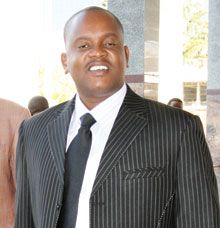Media Bill threatens democracy-Ntuane
BAME PIET
Staff Writer
| Thursday August 7, 2008 00:00


The Bill was presented to Parliament by the Minister for Communications, Science and Technology, Pelonomi Venson-Moitoi. The Bill gives the minister powers to dictate the operations of the private press and this has not gone down well with the media and some MPs. In a lengthy contribution yesterday, Ntuane said that the Bill threatens the fundamental elements of democracy like the freedom of expression, under which the liberal democratic society of Botswana was founded. He cautioned that the proposed law will be a reversal of what Botswana has achieved since independence. 'This law is a departure from our democratic principles on which Botswana was founded,' he said. The MP urged his colleagues and government to come up with laws that will assist the media to grow and maintain the status of Botswana as a liberal and credible democracy. The assertive MP has found himself in trouble with his party for speaking his mind. He said sections of the Bill that give the minister powers to appoint and dissolve a media complaints and appeals committee is unfair. He said that the minister's interference will kill the spirit of self- regulation, as requested by the media fraternity. At this point, the MP for Maun East, Ronald Ridge interjected on a point of clarification saying the minister already has control over the government print and electronic media. He wondered why the minister wanted to add more to the list by controlling the private press. The interference of the minister, Ntuane said, will cause press censorship. He added that even members of the committees that will be appointed by the minister will not do their job impartially, since they will be in fear of losing their source of income.
Prior to the tabling of the Bill, Venson-Moitoi featured alone in Radio Botswana and Btv debates stating that the proposed law is good and has been welcomed by the media fraternity. However, media representatives have denied ever agreeing to the Bill. Ntuane cited sections of the Bill, which media practitioners have rejected, such as the registration of journalists. The media representatives have argued that the registration will limit the right to freedom of information only to reporters when such right should be open to all citizens. The media fraternity has made it clear that they are against registration or accreditation, since it can be done through the Press Council that already exists.
Ntuane wondered why the minister wanted to speed up on the introduction of the law when she has not audited the performance of the Press Council and other self-regulation bodies. He wanted to know, for instance, how many defamation cases were brought before the courts since the establishment of the Press Council, and whether there was a crisis that warranted the introduction of a law that has been termed draconian, by some sections of society. He advised the minister to come up with at least a law equivalent to the Legal Practitioners Act, Health Practitioners Act or National Broadcasting Act. He said that the latter National Broadcasting Act regulates an industry that has something to do with dissemination of information.
Earlier, the MP described how Botswana has developed from a time when there was only one government controlled radio station and newspaper. He said that then government monopolised dissemination of information unlike today when one can choose to listen to a radio station or read a newspaper of his or her choice.
